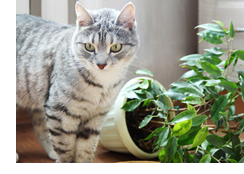
Spring time is often associated with cleaning, fresh smelling rooms and putting out a nice pot of sweet smelling flowers. As the season blossoms here is the main list of toxic plants that you should keep away from your cat.
ALOE VERA
If ingested causes: vomiting, depression, diarrhoea, anorexia and trembles
AZALEA/RHODODENDRON
The leaves are the most poisonous
If ingested causes: drooling, diarrhoea, depression or lethargy and weakened coordination.
BABY’S BREATH
If ingested causes: vomiting and diarrhoea.
CARNATIONS
Not as toxic as other plants, but still one to avoid.
If ingested causes: mild stomach upsets and mild dermatitis.
CHRYSANTHEMUM
If ingested causes: vomiting, diarrhoea, excess saliva (hyper salivation), and dermatitis.
DAFFODIL
The daffodil bulbs are by far the most toxic part of this plant.
If ingested causes: vomiting, excess saliva, diarrhoea;
Excess ingestion causes: convulsions, low blood pressure, tremors and abnormal heartbeat.
IVY
The foliage is the most poisonous part of this plant.
If ingested causes: vomiting, abdominal pain, excessive salivation and diarrhoea.
LILIES
Warning: This is one of the most toxic plants to cats!
If ingested causes: kidney failure.
MORNING GLORY
If ingested causes: hallucinations, gastrointestinal upset, agitation, tremors, disorientation, paralysis and anorexia.
POINSETTIA
This is a common Christmas decoration.
If ingested causes: mild vomiting, and irritation around the mouth and stomach.
TOMATO PLANT
Tomatoes are not a threat to our pets, but the plant itself is.
If ingested causes: hyper salivation, lack of appetite, severe stomach upset, diarrhoea, drowsiness, depression, confusion, behavioural change, weakness, dilated pupils, slow heart rate.
TULIP
The bulb which is buried in soil at the bottom is the most poisonous part of this plant, which is fine if your cat doesn’t dig.
If ingested causes: stomach upset, drooling, loss of appetite, depression, convulsions and increased heart rate.
If you suspect that your cat has eaten something that he or she shouldn’t have, please contact Pet Doctors Palm Beach on 5576 0400 immediately. We recommend catnip to keep your cat away from toxic plants, but the safest way is to keep these plants out of your home entirely.

